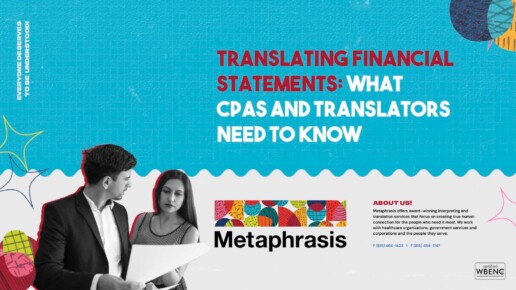Translating Financial Statements: What CPAs and Translators Need to Know
In a world increasingly defined by global commerce, the need for accurate and culturally-sensitive financial translations is more crucial than ever. Financial statements are the language of business, and translating them involves more than simply switching words from one language to another. It’s about ensuring the translated content maintains its original meaning, adheres to financial regulations, and resonates across cultural and legal borders. For CPAs and financial translators, this means combining accounting expertise with linguistic precision. This guide looks in-depth at translating financial statements, highlighting important insights you should know as a CPA or translator, or if you intend to venture into this industry.
Understanding Financial Reporting
Financial reporting is the systematic process of presenting a company’s financial performance to external parties, such as investors, regulators, and other stakeholders. These reports include documents like income statements, balance sheets, cash flow statements, and shareholders’ equity statements. Their primary function is to provide transparency and allow for informed decision-making. When these documents cross international borders, accurate translation becomes imperative. A single misinterpreted term can lead to legal ramifications or financial misjudgments.

What CPAs and Translators Need to Know
Accounting Principles
CPAs and financial translators must be deeply familiar with accounting principles such as Generally Accepted Accounting Principles (GAAP) and International Financial Reporting Standards (IFRS). GAAP is primarily used in the United States, while IFRS is used in over 140 countries. Understanding these standards helps ensure that translated financial documents maintain compliance and consistency.
For example, revenue recognition under GAAP may differ significantly from IFRS, so a translator must know not only the linguistic equivalent but also the underlying financial concept. This depth of knowledge helps avoid translation errors that could mislead stakeholders.
Clarifying International Standards
Translators often encounter challenges when aligning local accounting standards with international ones. Certain financial terminologies may not have direct equivalents in other languages, or we might carry different connotations. For instance, the term “deferred revenue” in English might not translate easily into languages that don’t use compound financial concepts the same way.
Both CPAs and translators should work together to clarify how specific standards are applied in the target country. This collaborative approach ensures the translation maintains legal accuracy and is understandable to the end user.
The Importance of Collaboration
One of the biggest mistakes companies make is treating financial translation as a one-person job. The reality is that it requires a team effort. CPAs bring subject matter expertise, while translators bring linguistic accuracy. Working together can eliminate ambiguities, ensure regulatory compliance, and maintain the document’s integrity.
Frequent collaboration between CPAs and translators also helps in developing glossaries of standardized terms, reducing the chances of inconsistencies across multiple reports.
Leveraging Technology
Modern translation tools such as CAT (Computer-Assisted Translation) tools, terminology management software, and even AI-driven platforms can help streamline the financial translation process. However, technology should complement—not replace—the human touch.
While these tools can improve efficiency, human oversight is essential for ensuring that complex financial nuances are correctly interpreted. CPAs can also benefit from financial reporting software that supports multilingual capabilities, making cross-border financial management easier.
Dealing with Typical Problems in Financial Translation
Common issues in financial translation include:
- Numerical Formatting: Different countries use commas and periods differently (e.g., $1,000.50 in the US vs. €1.000,50 in Europe).
- Terminology Confusion: Similar terms may have different meanings in different accounting systems.
- Cultural Context: Phrasing and tone can vary significantly across cultures and might influence how information is perceived.
Overcoming these issues requires a well-trained translator who understands both the language and the accounting system. Similarly, CPAs must be aware of the challenges that translations can pose and be prepared to guide the process.
Pursuing a Career as a CPA
Becoming a CPA involves rigorous education, experience, and licensing. Candidates typically need a bachelor’s degree in accounting or a related field, followed by passing the CPA exam, which covers auditing, financial accounting, regulation, and business concepts.
CPAs who wish to specialize in international finance or translation-related roles should consider additional training in IFRS and foreign languages. Having global experience or certifications in international business can also be a major asset.
Pursuing a Career as a Financial Translator
A career in financial translation requires a unique blend of skills—linguistic fluency and financial literacy. Most financial translators hold degrees in languages, finance, or both. Certification from recognized organizations like the American Translators Association (ATA) or specific financial translation courses can give candidates a competitive edge.
Strong research skills, attention to detail, and a solid understanding of local and international financial laws are also essential. Experienced financial translators often collaborate with accounting professionals to ensure their work meets industry standards.
Final Thoughts
In today’s interconnected economy, financial documents must not only speak the language of numbers but also the language of global stakeholders. For CPAs and financial translators, the stakes are high—accuracy, clarity, and compliance are non-negotiable. By understanding international standards, collaborating effectively, and leveraging technology wisely, professionals in both fields can ensure the integrity of financial translations.
Whether you’re a CPA looking to expand your global expertise or a translator diving into the complex world of finance, remember: communication is key, and precision is your greatest asset.

